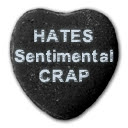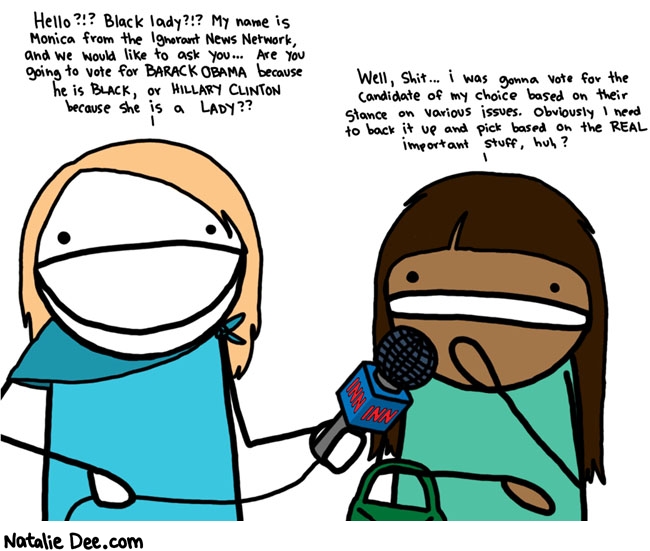(I can’t apologize for broaching this subject again because it’s on my mind, but this should be the last I say about it for awhile. Bear with me.)
The other day I commented about product placement from the point of view of a sibling. My little sister just turned twelve last week, and I find myself cringing as I watch her so long for some of the things her classmates and friends have. It really can make you sick, wishing and wanting — and it’s unnecessary, from that view, for anyone to encourage the natural longing of a child to have what others have, with actual product names in their literature.
My niece went through a phase like that. I remember her sitting in front of the TV one Christmas season when she was about four and complaining that she wanted EVERYTHING she saw on every commercial. She concluded with, and I kid you not, “I want to ‘Safeguard the ones you love.'” Yes. She was quoting a ANTIBACTERIAL SOAP commercial. My sister laughed… and then turned off the tv for a week or so.
I batted this topic around with my writing group and came up with a surprisingly reply. A dear friend and former marketing professional challenged the idea that product placement is all bad. She remarked,
“Kids are inundated with marketing and product placement left and right. It’s our culture and our political make-up. We are a material, consumeristic [sic] society, thanks to the machine we call American capitalism. If people don’t consume, the economy sours. The big push in both business and politics is to keep people consuming so our economy will stay strong.
Is it right? That’s debatable. Is it good? Would it be better if everyone saved instead of spending all that they make, living paycheck to paycheck so they can drive fancy cars, own the latest gadgets, and wear designer duds? Absolutely, but many economists think our economy would literally tank as a result.
I believe kids are smart and marketing-savvy. I don’t think they feel the need to drink a Coke every time they watch American Idol. At the same time, I think they are suckers for name brands the way I am, and most of my friends are. We are all marketing victims. I’d love to hear from anyone in our group who thinks they aren’t to some degree.”
I’m really glad someone is willing to articulate their viewpoint that this practice just might be defensible. I tried to sit and really think about what my friend said. Don’t I have particular brands of even computers or ink pens that I prefer? Aren’t PC people all into Windows (Um, no.)? Maybe I’m just not opinionated enough with regard to things; I can’t even think of a fabric I prefer (Cotton? Or wool. Or linen! It’s just so hard!).
 What I do know is this: I’m unprepared to even discuss the economy as compared to the wellbeing of my sister or any child. They spout that tripe periodically to keep people buying, but even if we all had to give up our Beamer’s and townhouses by the sea and go back to buttons and shells for bartering, the economy will be fine. It’s the little sisters whose strengths and needs and minds need to be paramount. Not to put too fine a point on it, or venture deeply into what is political ideology, less than 2% of the country lives at the level that these economists trumpet as being so crucial to the much-vaunted American Way of Life which we must at all costs protect. I can’t go with that big a picture. I, like you, can only concentrate on the little girl I know.
What I do know is this: I’m unprepared to even discuss the economy as compared to the wellbeing of my sister or any child. They spout that tripe periodically to keep people buying, but even if we all had to give up our Beamer’s and townhouses by the sea and go back to buttons and shells for bartering, the economy will be fine. It’s the little sisters whose strengths and needs and minds need to be paramount. Not to put too fine a point on it, or venture deeply into what is political ideology, less than 2% of the country lives at the level that these economists trumpet as being so crucial to the much-vaunted American Way of Life which we must at all costs protect. I can’t go with that big a picture. I, like you, can only concentrate on the little girl I know.
And I think this little girl is potentially savvy enough to know when she’s being marketed to, but only if she is told. My mother never allowed us to wear someone else’s brand name on our bums, and I never wore one thread of clothing that proclaimed its name – or the name of any band or cartoon or anything. Mom said if they weren’t paying me, I wasn’t wearing it, and if I had kids of my own I think I’d lean the same direction. My mother cut out all of our tags (including taking embroidery scissors and snipping embroidered names from denim) and left in washing instructions covered by our initials (three girls, laundry squabbles halved when clothes are identified. Plus: bonus clothing I.D. for school!). She had an opinion on this in terms of class and money, and she was pretty hardcore about it when I was younger. (My younger sibs might get away with the occasional Muppet on their shirts, but even now, not often.)
This is not to say that I didn’t want the Pottery Barn Kids or Benetton sweaters I saw people wearing. I wanted a t-shirt that said J Crew right across the chest, but I never wore one, and wouldn’t wear one now. I know what it says: I have enough money to patronize these stores. That still isn’t true, and I don’t know what their company policies are, if they use sweatshop labor or whatever, and they’re not paying me to wear their name which is not the point, but it reminds me: I have a name. And an identity. And it isn’t J Crew. I don’t do walking advertisements. (I mean, how can I? I read Jennifer Government and Feed.)
My marketing friend points out,
“So books have been free of this product placement? I actually don’t think this is necessarily true. Many of the books I read are laced with brand names. And even of us in our group have incorporated brands into our work. Innocently, of course. We’re not getting paid to do so. But why not? It will happen anyway if the book is ever made into a movie or a tv show. Why can’t I get a bit of the pop too? Especially if I was planning to name drop anyway for free?”
Now, here is where I can feel I can respond to my friend with a solid point: Describing characters in terms of things they own and use tells me nothing about the character. Nothing. It tells me about the AUTHOR. And all the work we constantly put in to keep authorial interference OUT of our YA novels – realizing that we as the adult ARE NOT IMPORTANT to the story – it is really bizarre to me that someone would willingly insert themselves in that way. Product placement might tell me a bit about the character’s attitude or social class (“Gossip Girl,” with that series’ constant references to Prada and Burberry infers that people who use those products are… gossipy?), but only in the most shallow and negligible way.
Further, as a writing idea, product placement is a BAD one. My editor mentioned to me that she appreciates the lack of slang in a book, because slang dates writing. I remember reading a story or novel that referenced Seven Jeans and not knowing what the heck they were – thus pulling me out of the narrative, which is NOT a positive, in terms of craft. Marketing people know, in their own field that brands and jingles have a shelf life of — maybe — five years, if not fewer. Sure, trends come back, but if you’re trying to write a work with a little endurance, throwing in the name of a label or a fragrance, celebrity or item popular this year is potentially fatal at worst, and shallow at best. If authors are going to pepper their work with self-referential, idiosyncratic details, where is there room for me as a reader who isn’t into that? (And I can see the disbelief now: “Everybody knows” what Seven Jeans are. “Everybody” cool, anyway, is what the magazines would have you believe. That’s a fairly fifth grade idea, and I don’t buy it.)
Maybe what bothers me most is that a.) HarperCollins is aiming this new series of product-larded books at 8-to-12-year-old girls and b.) the head exec of their marketing group will write the books. Why girls? Theoretically males have the buying power in American society, right? Still pulling in those larger salaries, right? Yet it’s important to further entangle girls in the cycle of want, and start it even earlier? Because advertisers KNOW little girls are already susceptible to the shopping thing and grown up girls spend more money? Wow. Talk about taking advantage.
Do you see where this takes us? Into books not written by AUTHORS. Not by people trying to break into print, or who are already there, proven on their ability to write well. Now we have a marketing honcho. Pushing product. Onto girl children.
Actually embroidering mere fiction on top of all of this seems beside the point, doesn’t it?! The purpose of story is NOT to sell crap. NOT to shove morals down my throat. NOT to be pushing an agenda. HarperCollins has got to be kidding themselves if they think that selling people an advertisement makes sense. (Of course, I don’t think they’re counting on it making sense. They’re just counting on the fact that they think tween readers are suckers.)




